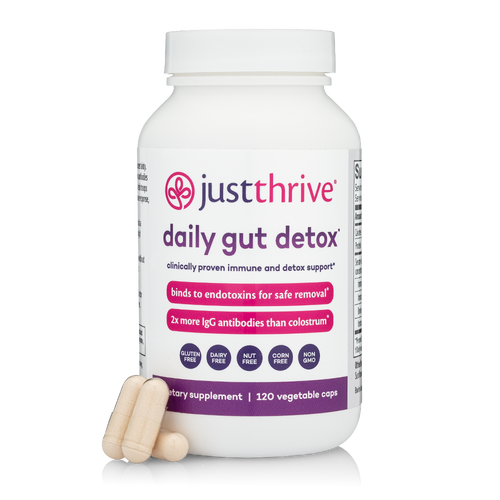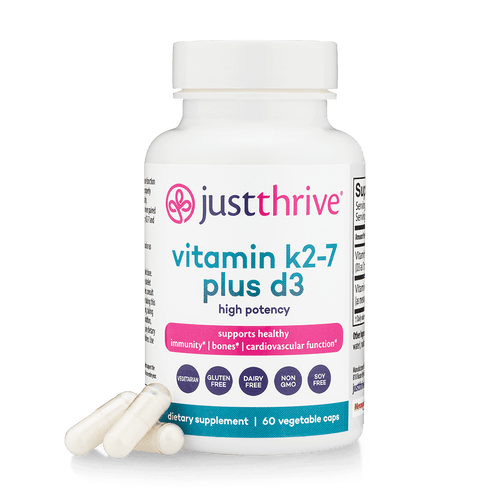This blog has been updated for quality and relevancy on September 18, 2025.
Chest pain, wheezing, endless coughing, and panic... Living with asthma is exhausting.
With pollen in the air and cold nights arriving, attacks can spike unexpectedly.
But what if the root of the problem wasn’t just your lungs and the real culprit—and the real solution—was hiding somewhere you’d never expect?
Does Asthma Start in Your Gut?
Asthma attacks can feel terrifying—whether you’re struggling to take a breath or watching your child gasp for air. This frightening condition causes horrible symptoms:
- Wheezing
- Chest pain and tightness
- Severe trouble breathing
- Endless coughing
- Extreme exhaustion
- Panic and anxiety
Even medication can’t completely stop asthma attacks; that’s why everyone with asthma carries a rescue inhaler. But scientists are beginning to realize that there may be a way to reduce the frequency and severity of asthma attacks… and possibly even prevent them from ever happening.
It turns out that your microbiome—the trillions of good and bad bacteria in your body—has an enormous positive impact on asthma.[1]
BUT... when your microbiome is out of balance (a state known as dysbiosis), asthma can be much harder to manage.
Read on to learn more...
What Happens in an Asthma Attack
Dozens of triggers can set off your immune system and provoke an asthma attack. The most common include:
- Pollen
- Cigarette smoke
- Dust mites
- Pet hair
- Colds and other respiratory infections
- Cold, dry air
- Emotional or physical stress
- Perfumes and other strong odors
- Chemical fumes (from things like cleaning products)

Those irritants set off a wild overreaction in your immune system. Special cells from your immune system go haywire, travel to your lungs, and react in a way that is and far out of proportion to what’s really going on, causing inflammation and mucus overproduction in your lungs, and tightening your airway.
That can lead to wheezing, coughing, and so much difficulty breathing that you may feel like you’re drowning.
If you suffer from asthma, you never know when your immune system will go haywire and attack. But there is something you can do. With the right approach, you can train your immune system for optimal respiratory health.
The key lives in your gut…

How Your Gut Microbiome Affects Your Lungs
What happens in your gut doesn’t stay there. The bacteria in your gut microbiome actually affects the rest of your body, and that includes your lungs. In fact, your gut and your lungs are in constant contact through something known as the gut-lung axis.
Your gut microbiome plays an enormous part in how your immune system functions, and that includes system over-reactions that can cause allergies and asthma.[2]
When dysbiosis (gut bacterial imbalance) sets in, and there are more bad bacteria (pathogens) than good bacteria (probiotics), your immune system can’t work the right way.
And get this: New research has found that gut dysbiosis could lead to chronic lung inflammation disorders—especially asthma.[3]
Gut Dysbiosis Makes Asthma Symptoms Worse
It’s not just an idea: An imbalanced gut microbiome has a substantial negative impact on asthma attacks.
Scientists conducted a pilot study to see exactly how the gut microbiome affected asthma symptoms in patients.[4] They analyzed fecal samples of 24 asthma patients and 8 people without asthma… and their findings were eye-opening (and a little gross).
The asthma patients had very different gut bacteria than the healthy subjects. People with asthma had less diversity (fewer different strains of gut bacteria) and many more pathogenic bacteria. And the patients with the worst dysbiosis also had the worst lung function.
How Beneficial Bacteria Support Lung Function
All of the bacteria in your body—good and bad—produce metabolites when they eat. All of those metabolites travel throughout your body…including your lungs.[5]
However, your beneficial bacteria actually produce helpful metabolites including:
- Essential B vitamins and vitamin K2
- Powerful antioxidants, like astaxanthin and lycopene
- Helpful short chain fatty acids (SCFAs), like butyrate and propionate
These metabolites help support lung function and encourage a healthy airway (more on that in a second). When you don’t have enough beneficial bacteria in your microbiome (dysbiosis), your body won’t have enough SCFAs to protect your lungs.[6]
On the flip side, bad bacteria (pathogens) produce harmful metabolites, like compounds that cause inflammation and immune system overreactions. So when your gut microbiome has more pathogens than probiotics, it sets the stage for more problems with your lungs. That leads to more trouble breathing, wheezing, and coughing fits.
The good news is, when you support the probiotic population in your gut, it helps crowd out the pathogens, and can have a very positive impact on your lung function.
SCFAs Calm Airways
Short chain fatty acids—especially butyrate and propionate—help keep inflammation under control, and that includes the airway inflammation that can make it feel like your lungs are closed off. That’s because SCFAs calm down the immune system cells responsible for runaway inflammation.
When you have healthy levels of beneficial bacteria in your gut microbiome, your body will naturally produce these helpful SCFAs.
NOTE: One of the best way to encourage SCFA production is to feed your good gut bugs plenty of their favorite food:prebiotic fiber.[7]
Consuming the right prebiotic dietary fiber supports healthy levels of SCFAs and while also supporting optimal respiratory function.[8] When you have plentiful supplies of SCFAs in your system, your immune system gets better instructions about when to mobilize and when to relax.
Studies show that butyrate (one of the main SCFAs produced by beneficial probiotics) encourage a healthy lung inflammatory response and balanced mucus production in the lungs.[9] Those actions can dramatically impact asthma attacks…
Scientists have also found that children with higher levels of SCFAs butyrate and propionate in their systems are more likely to stay healthy and enjoy great lung function.[10]
Astaxanthin For Healthy Lungs
Astaxanthin is a vibrantly colored antioxidant (it’s what makes salmon pink) created by certain beneficial gut bacteria. Along with its strong antioxidant powers, astaxanthin also has a remarkable calming effect on the breathing passages.
In one animal study[11], scientists learned that giving astaxanthin to mice:
- Supported airflow
- Championed healthy lung capacity
- Helped keep immune responses balanced
- And encouraged a healthy inflammatory response
So ensuring your microbiome has plenty of fresh astaxanthin is one way to feel confident your body (and your lungs) have what they need to thrive.
Plus, good gut bacteria produce astaxanthin right in your intestines, making it incredibly easy for your body to absorb and use quickly.
Just Thrive Probiotic Supports Your Immune System and Your Lungs
The four clinically studied spore probiotics in Just Thrive work together to maintain a healthy bacterial balance in your microbiome. And when your gut microbiome has a healthy balance, it supports your lungs, immune function, and total body wellness.
Plus, the unique combination of spore probiotics in Just Thrive supplies your immune system with healthy short chain fatty acids (SCFAs) like butyrate and powerful antioxidants like astaxanthin.
>> Try Just Thrive Probiotic today to keep your gut—and your lungs—healthy and happy.
But if you’re not quite sure about trying Just Thrive Probiotic, we can help with that.
EVERY Just Thrive purchase is covered by our Bottom of the Bottle, 100% money back guarantee.
That means you can try it to see how well it works for you… and we’re betting that you’ll notice a positive difference.
But if for any reason you're not satisfied, you can ask for a full product refund at any time. Even if it’s 3 months or 3 years later. Even if the bottle is empty!

Sources
- Barnig C, Martin C. Asthme et microbiome [Asthma and the microbiome]. Rev Mal Respir. 2018 Feb;35(2):103-115. French. doi: 10.1016/j.rmr.2017.03.039. Epub 2018 Feb 23. PMID: 29482867.
- Ver Heul A, Planer J, Kau AL. The Human Microbiota and Asthma. Clin Rev Allergy Immunol. 2019 Dec;57(3):350-363. doi: 10.1007/s12016-018-8719-7. PMID: 30426401; PMCID: PMC7449604.
- Frati F, Salvatori C, Incorvaia C, et al. The Role of the Microbiome in Asthma: The Gut⁻Lung Axis. Int J Mol Sci. 2018;20(1):123. Published 2018 Dec 30. doi:10.3390/ijms20010123
- Begley L, Madapoosi S, Opron K, et al. Gut microbiota relationships to lung function and adult asthma phenotype: a pilot study. BMJ Open Respir Res. 2018;5:e000324. doi:10.1136/bmjresp-2018-000324
- Anand S, Mande SS. Diet, Microbiota and Gut-Lung Connection. Front Microbiol. 2018;9:2147. Published 2018 Sep 19. doi:10.3389/fmicb.2018.02147
- Cait A, Hughes MR, Antignano F, et al. Microbiome-driven allergic lung inflammation is ameliorated by short-chain fatty acids. Mucosal Immunol. 2018;11(3):785-795. doi:10.1038/mi.2017.75
- Holscher HD. Dietary fiber and prebiotics and the gastrointestinal microbiota. Gut Microbes. 2017;8(2):172-184. doi:10.1080/19490976.2017.1290756
- Trompette A, Gollwitzer ES, Yadava K, et al. Gut microbiota metabolism of dietary fiber influences allergic airway disease and hematopoiesis. Nat Med. 2014;20(2):159-166. doi:10.1038/nm.3444
- Vieira RS, Castoldi A, Basso PJ, Hiyane MI, Câmara NOS, Almeida RR. Butyrate Attenuates Lung Inflammation by Negatively Modulating Th9 Cells. Front Immunol. 2019;10:67. Published 2019 Jan 29. doi:10.3389/fimmu.2019.00067
- Roduit C, Frei R, Ferstl R, et al. High levels of butyrate and propionate in early life are associated with protection against atopy. Allergy. 2019;74(4):799-809. doi:10.1111/all.13660
- Hwang YH, Hong SG, Mun SK, et al. The Protective Effects of Astaxanthin on the OVA-Induced Asthma Mice Model. Molecules. 2017;22(11):2019. Published 2017 Nov 21. doi:10.3390/molecules22112019












